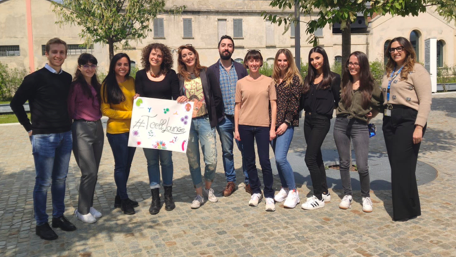Facciotti Federica, PhD
Assistant Professor in General Pathology

OPEN POSITION
The lab is currently open for applications of both cellular immunology and computational
_PhD candidates
_Master’s thesis (minimum 12 months) candidates
Send applications to Federica.facciotti@unimib.it with CV
Mucosal Immunology Lab (Biomedicine area)
Keywords
Mucosal Immunology, Microbiota, T cells, iNKT cells, Th17, IBD, Crohn’s Disease, Ulcerative Colitis, Colorectal cancer
Research Group

Background
I am a T cell immunologist, with a strong expertise in human chronic autoimmune pathologies. My research interests focus on the role of conventional and unconventional T cells in contributing to tissue homeostasis, in participating to inflammatory immune responses and in the control of epithelial neoplastic transformations. In recent years, I gained interest in the functional interaction between the immune system and the gut microbiota in driving pathogenic or tolerogenic activities in mucosal immune (T) cells.
By taking advantage of a translational approach, comprising the study of both human specimens and of murine models of human pathologies, during my research activity I acquired a broad experience in the study of human autoimmune disorders (Inflammatory Bowel Diseases, Type 1 Diabetes, Systemic Lupus Erythematosus and Rheumatoid Arthritis) as models of deregulation of T cell functions. More recently, I focused on mucosal immunology and on the role of intestinal T cells in contributing to tissue homeostasis and in participating to inflammatory immune responses in IBD and in colorectal cancer. The study of T cell activation cues in the intestinal microenvironment led me to investigate in depth the functional interplay between intestinal T cells and the gut microbiota.
Research interest
My research group specifically focuses on understanding and functionally manipulating for therapeutic purposes the interactions between the mucosal immune system and the intestinal microenvironment.
The intestinal compartment is a complex biological system composed by different type of cells (immune cells, epithelial cells, gut microbiota) involved in functional crosstalks aimed at maintaining a balance between tolerance and immunity. These interactions may give rise to different functional outcomes. In healthy conditions immune cells contribute to intestinal homeostasis maintenance, while in genetically predisposed individuals hyperactivation of immune cells may lead to in chronic autoimmune intestinal inflammation. In the context of intestinal tumours, defective activation of immune cells may contribute to decreased immunesurveillance and tumour development.
Specifically, our projects focus at:
-Deciphering the role of conventional and unconventional intestinal CD4+T helper cells in contributing to tissue homeostasis and in participating to inflammatory immune responses;
-Understanding the functions of intestinal T lymphocytes in the control of epithelial neoplastic transformations;
-Dissecting the functional interactions between T cells , the gut microbiota and the intestinal microenvironment during intestinal neoplastic transformation and inflammation
-Manipulating the function of immune cells for therapeutic purposes.
To do so, we take advantage of a translational approach involving in vitro systems, murine models of colorectal cancer and intestinal inflammation, and patients’-derived surgical specimens.
Research projects
The intestinal compartment is a complex environment composed by different type of cells (immune cells, epithelial cells, gut microflora) involved in functional interactions aimed at maintaining a balance between tolerance and immunity. Thus, the research activity of my lab is being oriented by two questions:
-How are conventional and unconventional CD4+T cells functionally influenced by the surrounding microenvironment during homeostatic or pathogenic conditions?
-Is it possible to implement immune cells phenotype and functions for predictive, prognostic or therapeutic purposes, upon elucidation of the mechanisms controlling their activity?”
Specific projects of the lab:
1.The evaluation of the phenotypic and functional status of immune cells isolated from intestinal specimens of sporadic and inflammation-associated colorectal cancer (CRC) patients and the study of the interactions between the immune system and the intestinal tumor microenvironment. In addition, this project aims at investigating how cancer cells might positively or negatively affect T cells activation by expressing specific inhibitory molecules or by displaying cancer-associated lipid antigens (Start-UP AIRC 2013).
2.The evaluation of the interaction between mucosal immune cells isolated from intestinal specimens of sporadic and inflammation-associated colorectal cancer (CRC) patients and the gut microbiota in the immuneregulation of colorectal cancer development (IG-AIRC 2019).
3.The understanding of the behavior of the mucosal immune system during both homeostatic and inflammatory conditions. The requirements for the functional activation of T cell subsets in the gut and which is their functional effect on epithelial cells is being explored with a translational approach involving both murine models of intestinal inflammation and surgical specimens of patients with chronic intestinal inflammation (IBD) (Ministero della Salute Giovani Ricercatori 2013).
4.Recent evidences suggest that imbalances in the composition and in the function of the gut microbiota directly correlate, in genetically predisposed individuals, to autoimmune disease and to cancer development. Thus, a project in the lab aims at understanding how the gut microbiota affects mucosal T cell functions in health and disease (Ministero della Salute Giovani Ricercatori 2016).
Selected articles
1.Burrello C, Garavaglia F, Cribiù FM, Ercoli G, Lopez G, Troisi J, Colucci A, Guglietta S, Carloni S, Guglielmetti S, Taverniti V, Nizzoli G, Bosari S, Caprioli F, Rescigno M, Facciotti F.
“Therapeutic fecal microbiota transplantation controls intestinal inflammation through IL10 secretion by immune cells”
Nature Communications 2018 Dec 5;9(1):5184. doi: 10.1038/s41467-018-07359-8.
2.Díaz-Basabe A, Burrello C, Lattanzi G, Botti F, Carrara A, Cassinotti E, Caprioli F, Facciotti F
“Human Intestinal and Circulating invariant Natural Killer T cells are cytotoxic against Colorectal Cancer cells via the Perforin/Granzyme pathway”
Molecular Oncology, accepted 16 September 2021, doi:10.1002/1878-0261.13104
3.Strati F, Pujolassos M, Burrello C, Giuffrè MR, Lattanzi G, Caprioli F, Troisi J, Facciotti F
“Antibiotic-associated dysbiosis affects the ability of the gut microbiota to control intestinal inflammation upon faecal microbiota transplantation in experimental colitis models”
Microbiome. 2021 Feb 6;9(1):39. doi: 10.1186/s40168-020-00991-x
4.Facciotti F, Ramanjaneyulu GS, Sansano S, Lepore M, Chan RB, Seedorf U, Wenk M, Forss-Petter S, Berger J, Xia C, Mori L, De Libero G
“Peroxisome-derived lipids are self-antigens for invariant natural killer T cells”
Nature Immunology, Mar 18;13(5):474-8, 2012 doi: 10.1038/ni.2245.
Facciotti’s Lab – #FacciottiLab_BtBs
last update: February 2022